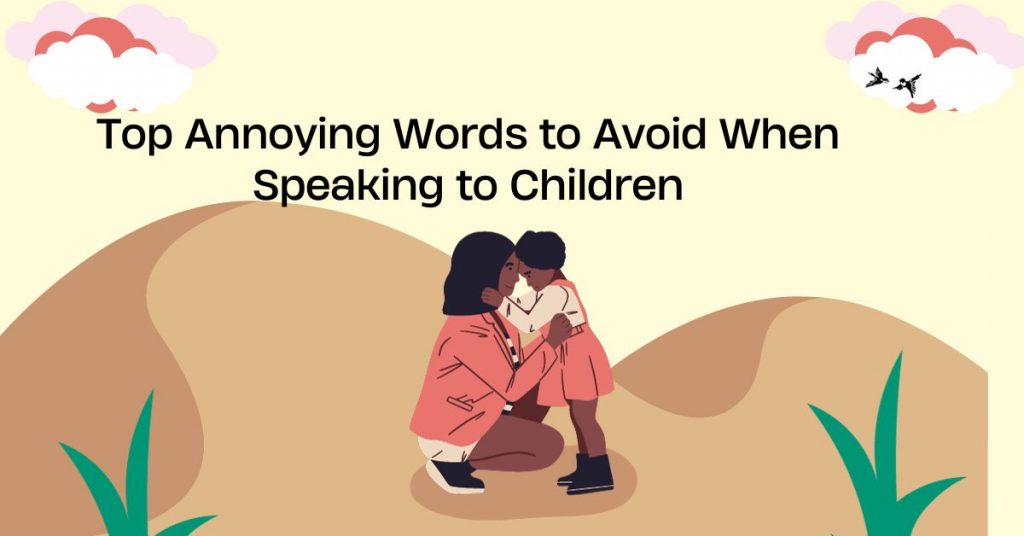As parents and caregivers, we strive to communicate with our children in a way that fosters understanding, respect, and a positive learning environment. However, there are certain words and phrases that can be quite annoying and counterproductive when talking to kids. In this article, we’ll explore some of these irritating expressions and offer alternatives that can help improve communication with children.
Using Positive Language:
One of the most effective ways to engage with children is by using positive language. Instead of focusing on what they shouldn’t do, emphasize what they should do. Here are some examples:

“Don’t” – Replace with “Please Do”
Instead of saying, “Don’t jump on the couch,” try saying, “Please sit down on the couch.” This approach provides clear instruction, making it easier for children to understand and follow.
“Stop Crying” – Replace with “It’s Okay to Express Your Feelings”
Telling a child to stop crying can be dismissive of their emotions. Instead, acknowledge their feelings and say, “It’s okay to express your feelings. Can you tell me what’s wrong?” This approach encourages emotional expression and communication.
The Impact of Words:
The choice of words is important:
Words are not just mere sounds; they hold great significance. Children are incredibly impressionable, and the words we choose can have a lasting impact on their self-perception and emotional development.
The Power of Positivity
Positive reinforcement and constructive communication can boost a child’s self-esteem and motivation. Avoiding annoying words is the first step towards a more nurturing environment.
Avoiding Negative Labels
Negative labels can be damaging to a child’s self-esteem and overall development. Instead of using derogatory terms, opt for more constructive language:
“You’re Bad” – Replace with “That Behavior Was Not Okay”
When a child misbehaves, refrain from calling them “bad.” Instead, address the behavior by saying, “That behavior was not okay. Let’s talk about why it’s important to make better choices.
“You’re So Clumsy” – Replace with “It’s Okay to Make Mistakes”
Children are still learning and growing, so it’s important to encourage them rather than criticize them. Instead of labeling them clumsy, say, “It’s okay to make mistakes. That’s how we learn.”
Communicating Effectively:
Alternative Approaches
Now that we’ve identified annoying words to avoid, let’s explore alternative approaches to communicating effectively with children.
Active Listening
Take the time to listen actively to what your child is saying. This fosters trust and encourages open communication.
Encouragement and Praise
Instead of criticism, offer encouragement and praise for effort and accomplishments, no matter how small.
Problem-Solving Together
Involve children in finding solutions to problems they encounter. This empowers them and teaches them valuable life skills.
Use “I” Statements
Express your feelings using “I” statements to avoid blaming or shaming. For example, say, “I feel upset when toys are left out” instead of “You always make a mess.
FAQs:
Can I never say “no” to my child?
It’s okay to say “no” when necessary, but try to explain your reasons and offer alternatives when appropriate.
What if my child misbehaves?
Address the behavior, not the child. Please encourage them to understand why their actions were inappropriate and how to make better choices next time.
How can I boost my child’s self-esteem?
Praise their efforts, celebrate their achievements, and provide unconditional love and support.
Is it okay to set boundaries?
Absolutely. Setting boundaries is essential for a child’s safety and development. Just be sure to communicate these boundaries with empathy.
What if I’ve already used some of these annoying words?
It’s never too late to improve your communication. Apologize if necessary and strive to make positive changes in your interactions with your child.
Conclusion
In conclusion, the words we choose when speaking to children have a profound impact on their development and self-esteem. By avoiding annoying phrases and embracing positive communication, we can create a nurturing and supportive environment for our kids to thrive. Remember, it’s not about being a perfect parent or caregiver; it’s about striving to be the best communicator and role model we can be.

